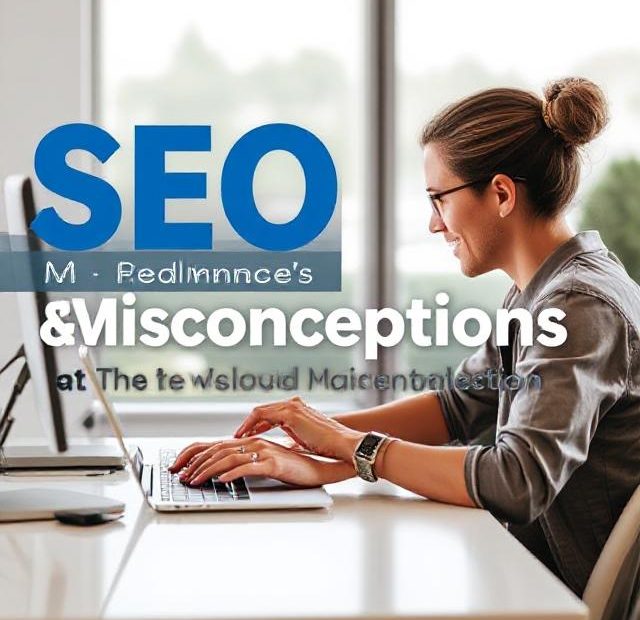Search Engine Optimization (SEO) is often misunderstood—even by seasoned marketers. The constant algorithm updates, changing best practices, and abundance of outdated advice make it easy for myths to spread. Believing in these misconceptions can waste time, hurt rankings, or worse, lead to penalties from search engines.
Let’s bust some of the most common SEO myths and clear up what works in today’s digital landscape.
Myth 1: SEO Is a One-Time Task
Reality: SEO is an ongoing process.
Many people believe that once they’ve optimized their website, they can move on to other things and never touch it again. This simply isn’t true.
Search engines are constantly evolving. New competitors enter the space, content gets outdated, and search behavior shifts over time. If you’re not regularly updating content, checking technical health, and monitoring performance, your rankings will eventually drop.
Myth 2: Keyword Stuffing Improves Rankings
Reality: Keyword stuffing can hurt your SEO.
In the early days of SEO, stuffing pages with keywords—even unnaturally—sometimes worked. But those days are long gone.
Today, Google prioritizes content that provides value and reads naturally. Overloading a page with keywords makes it hard to read and sends signals that you’re trying to manipulate rankings. Use keywords strategically—focus on intent, context, and natural placement.
Myth 3: More Links Always Mean Better Rankings
Reality: Quality > Quantity.
Backlinks are still an important ranking factor, but not all links are equal. One high-authority, relevant backlink is far more powerful than dozens of spammy or irrelevant ones.
Buying links, participating in link farms, or using automated link-building tools can trigger Google penalties. Instead, focus on earning links through quality content, digital PR, and authentic outreach.
Myth 4: SEO Is All About Ranking #1
Reality: High rankings are great—but they’re not everything.
Yes, ranking on the first page of Google is valuable. But SEO is also about attracting the right traffic and converting that traffic into leads or sales.
You might rank #1 for a high-volume keyword that brings in thousands of visitors, but if they don’t convert or aren’t even your target audience, it doesn’t mean much. Focus on search intent, relevance, and user experience—not just position.
Myth 5: Meta Descriptions Directly Impact Rankings
Reality: Meta descriptions don’t influence rankings, but they still matter.
Google has confirmed that meta descriptions do not directly affect your rankings. However, they do influence click-through rates (CTR) by acting as a pitch for your page in the search results.
A compelling meta description can mean the difference between someone clicking your link or skipping over it. So even though it’s not a ranking factor, it’s still a vital part of your SEO strategy.
Myth 6: Duplicate Content Is Always Penalized
Reality: Google doesn’t automatically penalize duplicate content.
There’s a common fear that having the same content in multiple places (e.g., product descriptions across pages) will get you banned or penalized. While Google does try to avoid showing duplicate results, it doesn’t issue automatic penalties for it unless it’s used to manipulate rankings.
The key is to minimize duplicate content when possible and use canonical tags properly when you can’t. Unique, value-added content will always outperform copied or thin content in the long run.
Myth 7: You Need to Submit Your Site to Google
Reality: Google can find your site on its own.
Years ago, it was common practice to manually submit your website to search engines. But modern search engines are far more advanced and will usually discover your site through backlinks or sitemaps.
Still, submitting a sitemap via Google Search Console can help speed up the process and give you access to important performance data and crawling insights. But it’s not a requirement for getting indexed.
Myth 8: Social Media Directly Boosts SEO
Reality: Social signals don’t directly affect rankings, but they help indirectly.
Google has stated that it doesn’t use likes, shares, or follower counts as direct ranking factors. However, content that performs well on social media tends to get more visibility, which increases the chances of earning backlinks.
Social media also drives traffic, builds brand awareness, and can contribute to user engagement—all of which support your broader SEO goals.
Myth 9: SEO Is Just About Content
Reality: Content is critical, but technical SEO and user experience matter too.
You can write the best blog post ever, but if your site loads slowly, isn’t mobile-friendly, or has crawl errors, it might never rank. SEO success depends on multiple pillars:
-
On-page SEO: Optimized titles, headers, and content.
-
Technical SEO: Site speed, mobile responsiveness, indexability.
-
Off-page SEO: Backlinks, social signals, brand reputation.
Ignoring any of these is like running a car on three wheels—it might move, but not well.
Myth 10: You Can “Trick” Google with Hacks
Reality: Black-hat tactics usually backfire.
From invisible text and doorway pages to automated link schemes, SEO has a dark past filled with manipulative tactics. While some may offer short-term gains, they often result in long-term penalties or complete deindexing.
Google’s algorithms are smarter than ever. Playing by the rules and focusing on value-driven content is the best long-term strategy.
Final Thoughts
There’s a lot of outdated, misleading, or outright false information about SEO floating around the web. The best way to succeed in SEO today is to stay informed, follow ethical practices, and focus on what matters: helping users.
Remember, SEO isn’t magic—it’s methodical, ever-changing, and rooted in delivering real value.
Also, you can learn more about SEO Trends here.
